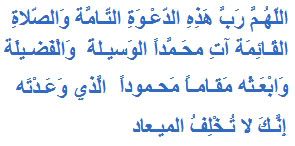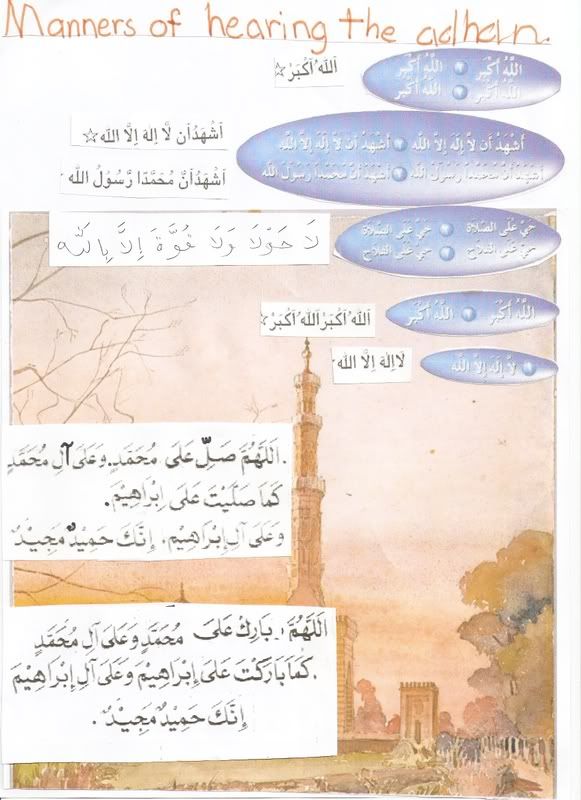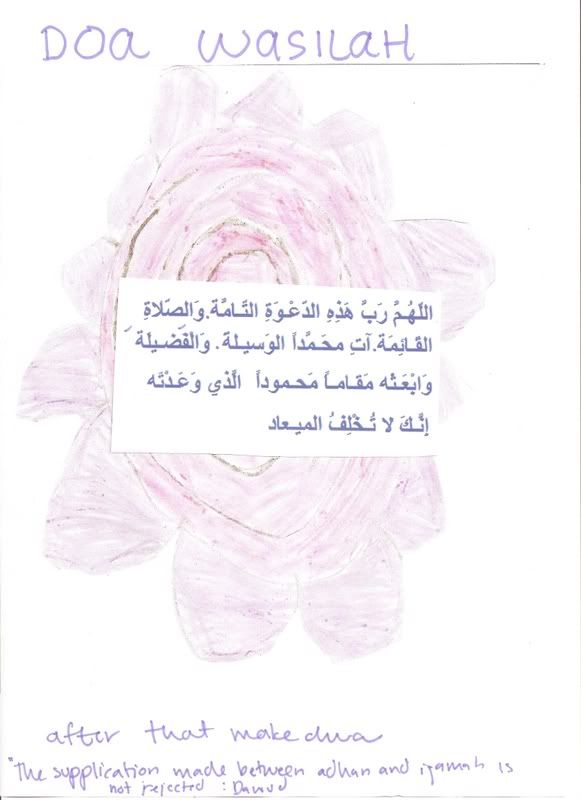Manners on Listening to the Adhan
WHAT WE SHOULD SAY/DO WHEN WE HEAR THE ADHAN
1. Repeat what the mu’adhin says
Bukhari :: Book 1 :: Volume 11 :: Hadith 585
Narrated Abu Said Al-Khudri:
Allah’s Apostle said, “Whenever you hear the Adhan, say what the Mu’adhdhin is saying.
Bukhari :: Book 1 :: Volume 11 :: Hadith 587
Narrated Mu’awiya r.a. as above (586) and added:
“When the Mu’adhdhin said, “Haiya alas-sala(t) (come for the prayer).” Muawiya said, “La hawla wala quwata illa billah (There is neither might nor any power except with Allah)” and added, “We heard your Prophet saying the same.”
Thus when we hear the adhan we must repeat back what the muadhin say except when he say
Hayya Alas-Solaah and
Hayya Alal- Falah
Then we answer
لا حولا ولا قوّة إلّا باللّه
Laa haw laa Qowwata Illa Billah
There is no power or might save with (except) Allah.
2. Invoke blessings to the prophets
Book of Prayer
Muslim :: Book 4 : Hadith 747
‘Abdullah b. Amr b. al-As reported Allah’s Messenger (may peace be upon him) as saying: When you hear the Mu’adhdhin, repeat what he says, then invoke a blessing on me, for everyone who invokes a blessing on me will receive ten blessings from Allah; then beg from Allah al-Wasila for me, which is a rank in Paradise fitting for only one of Allah’s servants, and I hope that I may be that one. If anyone who asks that I be given the Wasila, he will be assured of my intercession.
To invoke blessings upon the Prophet (PBUH) means to recite “Allahumma salli `ala Muhammadin, wa `ala ali Muhammadin, kama sallaita `ala Ibrahima wa `ala ali Ibrahima, innaka Hamidun Majid.” Wasilah literally means that mode or method by which one attains his goal, but here it stands for that high rank in Jannah which will be awarded to the Prophet (PBUH).
3. Make the doa wasilah
Bukhari :: Book 1 :: Volume 11 :: Hadith 588
Narrated Jabir bin ‘Abdullah:
Allah’s Apostle said, “Whoever after listening to the Adhan says, ‘Allahumma Rabba hadhihi-d-da’ watit-tammati was-salatil qa’imati, ati Muhammadan al-wasilata wal-fadilata, wab’ athhu maqaman mahmudan-il-ladhi wa’ adtahu (O Allah! Lord of this perfect call (of not ascribing partners to You) and of the regular prayer which is going to be established! Kindly give Muhammad the right of intercession and superiority and send him (on the Day of Judgment) to the best and the highest place in Paradise which You promised him)’, then intercession for me will be permitted for him on the Day of Resurrection”).
And then after the adzan is finished recite this dua

O Allah! Lord of this perfect call (of not ascribing partners to You) and of the regular prayer which is going to be established! Kindly give Muhammad the right of intercession and superiority and send him (on the Day of Judgment) to the best and the highest place in Paradise which You promised him)’, then intercession for me will be permitted for him on the Day of Resurrection
The word Shafa`ah means to beg someone to pardon somebody’s faults and shortcomings or to request someone for doing a virtuous deed. In the context of this Hadith, it refers to the privilege of intercession of the Prophet (PBUH) due to which he will request for the forgiveness of such people for whom he will be given permission by Allah.
Why do we make this dua?
Book of Prayer
Muslim :: Book 4 : Hadith 747
‘Abdullah b. Amr b. al-As reported Allah’s Messenger (may peace be upon him) as saying: When you hear the Mu’adhdhin, repeat what he says, then invoke a blessing on me, for everyone who invokes a blessing on me will receive ten blessings from Allah; then beg from Allah al-Wasila for me, which is a rank in Paradise fitting for only one of Allah’s servants, and I hope that I may be that one. If anyone who asks that I be given the Wasila, he will be assured of my intercession.
We make this dua because we are praying that Prophet Muhammad s.a.w will be given the right of intercession (shafaah) by Allah and we pray that we too will be rewarded by this. This is certainly what we need on judgment day. Judgment day would be very difficult for all of us, and Insya Allah with the will of Allah, intercession will be given to Prophet Muhammad, and the difficulties on that trying day would be alleviated. Prophet Muhammad s.a.w., with the will of Allah, will be given the syafaah to ask Allah to hasten the judgment process.
Read about intercession HERE. Then tell the children the story of syafaah in general.
4. Make dua to Allah in between the adhan and iqamaah
It is also preferred for us to invoke Allah between Azan and iqamaah, for invocation at this time is answered
Kitab As salat
Dawud :: Book 2 : Hadith 521
Narrated Anas ibn Malik:
The supplication made between the adhan and the iqamah is not rejected.
SUMMARY OF WHAT WE SHOULD DO UPON HEARING THE ADHAN
1. Respect the adhan by stopping conversation. Even reading the quran.
2. Stay focus on the adhan.
Repeating what the muadhin say except for the hayya alas-solah and hayya-ala-falah. Instead say la hawla walakuata illa bila
3. After adzan sends salaah to prophet (s.a.w)
4. Then read the dua’ wasilah
5. Make dua between azan and iqamah.
EXERCISE
I cut out out the words of adhan and jumble them up together with the response words. H is to arrange the adhan words while S is to label the correct response to them.
I also pasted the sallah to the prophets that we should read after hearing the adhan. We then took turns to read it and get familiar with them.
We also pasted the doa wasilah. We will stick it on one of the walls, Insya Allah, so that we can refer to it quickly as soon as we hear the adhan. Living in a Muslim country, the adhan can be heard loud and clear from the many mosques around us, Subhanallah.
For now I don’t expect S to be able to memorise all of the quickly. However if we strive to practise this sunnah, Insya Allah the memorising part will be made easy. may Allah makes difficult things easy for all of us.


OTHER MANNERS ON HEARING THE ADHAN
Book of Prayer
Muslim :: Book 4 : Hadith 1822
Narrated Abdullah bin Mughaffal Al Muzani r.a., “There is a salat between the two adhan (Adhan and iqama), there is a salat between the two adhan. And then while saying it the third time he added, “For the one who wants to (pray).”
If one hears the adhan when he is in the mosque, one should not leave the mosque.
The Book of Prayers
Muslim :: Book 4 : Hadith 1377
Abu Sha’tha’ reported: While we were sitting with Abu Huraira in a mosque a man went out of the mosque after the call to prayer had been announced. (A man stood up in the mosque and set off.) Abu Huraira’s eyes followed him till he went out of the mosque. Upon this Abu Huraira said: This man has disobeyed Abu’l- Qasim (Muhammad) (may peace be upon him).
Comments